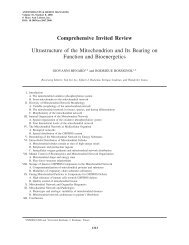MiPsummer Programme pdf - Mitochondrial Physiology Society
MiPsummer Programme pdf - Mitochondrial Physiology Society
MiPsummer Programme pdf - Mitochondrial Physiology Society
Create successful ePaper yourself
Turn your PDF publications into a flip-book with our unique Google optimized e-Paper software.
69<br />
Abstract # 38<br />
Evidence that fibroblasts from patients affected by Medium-Chain Acyl-Coa Dehydrogenase<br />
Deficiency (MCADD) are under chronic oxidative stress<br />
A. M. Tonin 1,2 , P. Fernandez-Guerra 1 , N. Cornelius 1 , R. K. J. Olsen 1 , M. Wajner 2 and N.<br />
Gregersen 1<br />
1 Research Unit for Molecular Medicine, Department of Clinical Medicine, Health, Aarhus<br />
University and Aarhus University Hospital, Skejby, Aarhus, Denmark<br />
2 Federal University of Rio Grande do Sul, Porto Alegre, Brazil<br />
Background Mutations in the ACADM gene causes MCADD. The clinical features are variable and<br />
the physiopathology has been related to energy deficiency, accumulation of toxic metabolites and<br />
presence or lack of misfolded MCAD protein, resulting in oxidative stress.<br />
Objectives To evaluate the extent of mitochondrial oxidative stress under different metabolic<br />
conditions in cultured skin fibroblasts of controls and MCADD patients carrying distinct ACADM<br />
mutations.<br />
Results Fibroblasts were grown in standard glucose concentration (11mmol/L) and after 24hrs the<br />
media were replaced by galactose (11mmol/L) or galactose and palmitate (100µmol/L). At<br />
standard glucose concentration, patient fibroblasts presented higher levels of mitochondrial<br />
superoxide compared to controls fibroblasts. In galactose media, the percentage of stressed cells in<br />
all groups increased, but the level of superoxide was still higher in the patient fibroblasts. When<br />
galactose plus palmitate media was used, patient fibroblasts with the c.[199TC] + [985AG]<br />
genotype, associated with mild disease, seem to have higher superoxide levels than patients<br />
carrying null mutations.<br />
Conclusion These results indicate that fibroblasts of MCADD patients are under chronic oxidative<br />
stress. It could be speculated that such mild stress exposure could induce an adaptive response,<br />
protecting cells against oxidative damage during pathological situations of metabolic stress like<br />
feverish infections.



